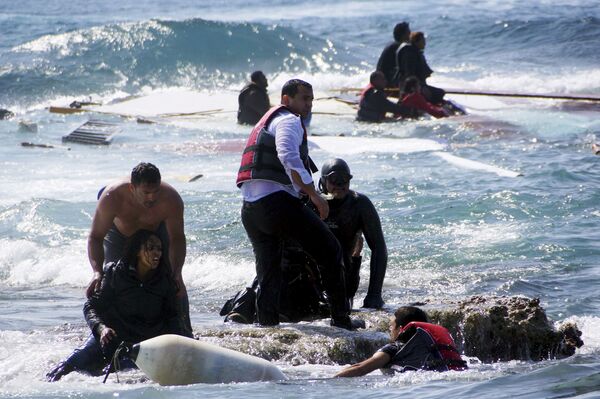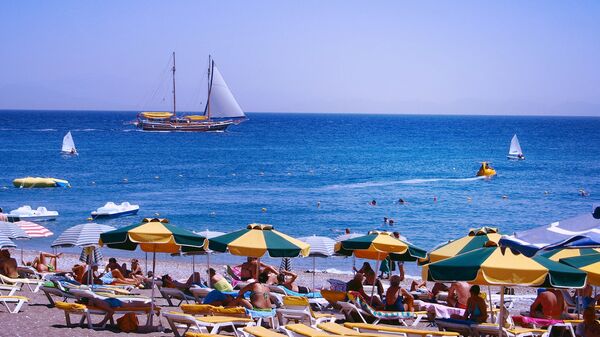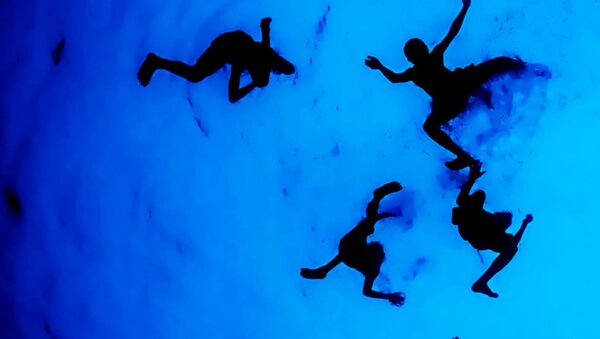Fifty thousand people seeking asylum arrived in July alone — a time when waters are more favorable and forgiving towards the rickety fishing vessels and rubber dinghies used by desperate migrants to cross the Mediterranean.
Staggering 750% increase in refugees & migrants arriving in #Greece compared to 2014. #Europe http://t.co/R7kuIUQ7KW pic.twitter.com/Pd1T5WorO4
— UN Refugee Agency (@Refugees) August 10, 2015
According to Vincent Cochetel, Director of the Bureau for Europe for the United Nations Refugee Agency:
"This humanitarian emergency is happening in Europe, and requires an urgent Greek and European response. Such a level of suffering should and can be avoided. The Greek authorities need to urgently designate a single body to coordinate response and set up an adequate humanitarian assistance mechanism."
But while Greece offers emergency assistance and support — the UN Refugee Agency has called on the Greek authorities — "To urgently designate a single body to coordinate response and set up an adequate humanitarian assistance mechanism."

But it can't be ignored that the Mediterranean country is just about keeping its economic head above water. The Greek economy is in recession, the country is on the cusp of securing a bailout from the European Union — in return for more austere living conditions, all the while the number of migrants arriving on its shores swells — by 750 percent.
"The generous response of Greek civil society, in a difficult context, should be recognized and supported," said the UN Refugee Agency.
Meanwhile, Greek Prime Minister Alexis Tsipras has admitted: "It is beyond what we can handle," and has hit out at 'The West'.
The majority of migrants arriving on Greek shores are from Syria, Afghanistan and Iraq. The number of migrants fleeing Syria shot up by 70 percent in July. Tsipras said:
"It is clear that the influx of refugees and migrants is a result of the military interventions carried out by the West, particularly in Syria and Libya, as well as in Iraq and Afghanistan."
The contrast in EU solidarity is clear in images of tourists basking in the sunshine while migrants are brought to shore on rubber dinghies by rescuers.

Many of the migrants are staying on the holiday islands of Lesvos, Samon and Kos. But the challenge for Greece doesn't end there. "More efforts are needed to ease access to the asylum procedure; only 6,200 have applied for asylum as of end of June," says the UN Refugee Agency.
And with equally challenging rhetoric, Alexis Tsipras responded by saying:
"It is not possible for host countries to be warehouses of human lives, nor can the Mediterranean become a sea-cemetery."
Already dubbed 'The Mediterranean Graveyard' — the Organization for Migration says there have been 2,000 drownings this year.
On the issue of migration, Tsipras says: "The EU serves no purpose if it will be a Union of individual states where each serves its own interests. It will be a Union with no prospects and future."
Desperate to secure the economic prospects and future for the Greek people, Tsipras' Syriza government and the creditors, otherwise known as the Troika, remain in talks on how much bailout money Greece needs — and will be granted. It's expected the talks will come to an end on Tuesday, 11 August.
But it's going to get worse for Greece — before it gets better.
The country must secure $94.22 billion (€86bn) from its creditors to be able to pay off its debt to the European Central Bank on August 20. The cost to the country, or the concessions — include more spending cuts, public sector reforms and privatization.
My statement regarding how to best manage the refugee flows to #Greece #imigration #refugeesGr http://t.co/h7jg4l0OlU
— Alexis Tsipras (@tsipras_eu) August 8, 2015
As the numbers of migrants arriving in Greece rapidly increase — so does the urgency for an agreement on the country's economic bailout program. The "issue of Greece is already testing the EU. In my view, the outcome regarding the economic crisis was negative. I hope that the EU will response positively to this important humanitarian issue and act with solidarity," said Alexis Tsipras.




